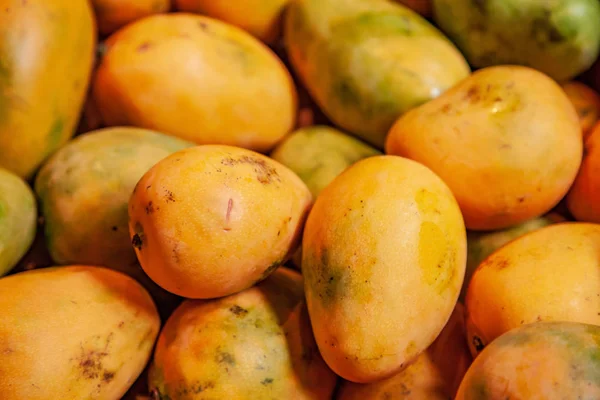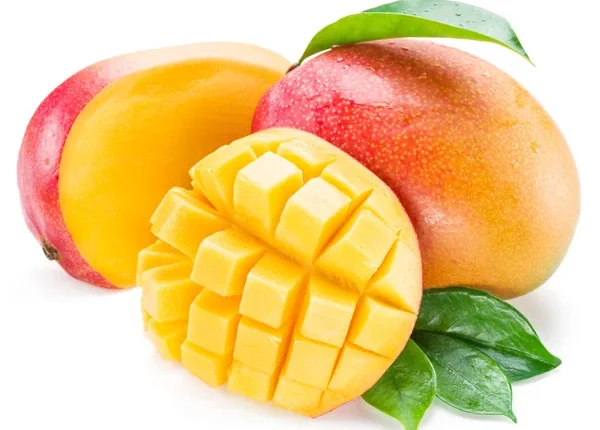Are you a fan of mangoes, let’s look at Mango Nutrition facts. Apart from being delicious, mangoes are also packed with vitamins, minerals, and other nutrients that are vital for a healthy body.
Mango fruits originated in South Asia but are now widely grown in tropical regions around the world. They come in different varieties, shapes, and sizes, and their flavors range from sweet to tangy. Mangoes are a rich source of vitamins, minerals, fiber, and antioxidants, which makes them an excellent addition to any healthy diet.
Mango Nutritional Information
Mangoes are a nutritious fruit that are low in calories and high in essential vitamins and minerals. One cup (165 grams) of sliced mango contains:
- Calories: 99
- Protein: 1.4 grams
- Carbohydrates: 24.7 grams
- Fiber: 2.6 grams
- Fat: 0.6 grams
- Vitamin C: 67% of the Reference Daily Intake (RDI)
- Vitamin A: 10% of the RDI
- Folate: 18% of the RDI
- Potassium: 6% of the RDI
- Copper: 20% of the RDI
- Magnesium: 8% of the RDI
- Vitamin B6: 11% of the RDI
In addition to these nutrients, mangoes also contain small amounts of calcium, iron, and zinc. They are also a good source of antioxidants like beta-carotene, which can help protect the body against oxidative stress and reduce the risk of chronic diseases. As well as dietary fiber, which can help regulate digestion and promote a healthy gut. [Source]
Also read | 7 Best Healthy Fruits for Nerve Regeneration

Health Benefits of Mangoes
Apart from being a tasty fruit, mangoes also provide several health benefits. Here are some of the most significant benefits of eating mangoes:
1. Boosts Immunity
Mangoes are an excellent source of Vitamin C, which is essential for a healthy immune system. Vitamin C helps protect the body against infections and diseases by strengthening the immune system.
2. Promotes Digestion
Mangoes are high in fiber, which helps regulate digestion and prevent constipation. Eating mangoes regularly can also help prevent the development of digestive disorders like irritable bowel syndrome (IBS).
3. Lowers Cholesterol
Mangoes contain pectin, a soluble fiber that can help lower cholesterol levels in the body. High cholesterol levels are a significant risk factor for heart disease, and eating mangoes can help reduce that risk.
4. Promotes Eye Health
Mangoes are an excellent source of Vitamin A, which is essential for healthy eyesight. Vitamin A helps prevent age-related macular degeneration, a common eye disorder that can lead to blindness.
5. Supports Heart Health
Mangoes are rich in potassium, which is essential for maintaining a healthy heart. Potassium helps regulate blood pressure and prevents heart diseases like stroke and heart attack.
6. Enhances Skin Health
Mangoes are rich in antioxidants like beta-carotene and vitamin C, which help protect the skin against damage from the sun and other environmental factors. Eating mangoes regularly can help improve your skin’s appearance and prevent premature aging.
7. Reduces Inflammation
Mangoes contain several anti-inflammatory compounds, including quercetin, mangiferin, and gallic acid. These compounds help reduce inflammation in the body and may help reduce the risk of developing chronic diseases like arthritis, cancer, and heart disease.
8. Improves Brain Function
Mangoes are rich in vitamin B6, which is essential for maintaining good brain function. Vitamin B6 helps improve cognitive function, memory, and mood.
Mango Selection Tips
-
Look for the right color: Mangoes come in a variety of colors, but the most common color for ripe mangoes is yellow. The red and green color on the mango does not indicate ripeness. Instead, focus on the yellow color and check for a fragrant smell.
-
Check for softness: Gently press the mango with your fingers. If it gives slightly, it is ripe and ready to eat. If it is too hard, it is not yet ripe. If it is too soft, it may be overripe.
-
Consider the shape: Mangoes come in a variety of shapes, but the ideal mango for eating should be oval or slightly oblong.
Mango Storage Tips
-
Keep at room temperature: Mangoes should be stored at room temperature until they are ripe. Once ripe, they can be stored in the refrigerator for a few days.
-
Store in a paper bag: To speed up the ripening process, place the mango in a paper bag and leave it at room temperature for a day or two.
-
Keep away from other fruits: Mangoes produce ethylene gas, which can cause other fruits to ripen faster. To prevent this, store mangoes away from other fruits.
-
Store in the refrigerator: If you have ripe mangoes that you are not ready to eat, store them in the refrigerator. Mangoes can be stored in the refrigerator for up to five days.
By following these tips, you can select and store mangoes properly and enjoy their delicious flavor and health benefits.
Learn about | Kale: Health Benefits And Nutrition Facts
How to Incorporate Mangoes Into Your Diet
There are many ways to incorporate mangoes into your diet. You can eat them fresh, slice them up in a salad, blend them into a smoothie, or use them as a topping for yogurt or oatmeal. Mangoes can also be used in cooking, as a flavoring agent in sauces and marinades.
Conclusion
Mangoes are a tasty and nutritious fruit that can provide several health benefits. They are low in calories but high in essential vitamins and minerals that are vital for a healthy body. Eating mangoes regularly can help boost your immunity, promote digestion, lower cholesterol, support heart health, and promote healthy eyesight.
So, what are you waiting for? Grab a mango and enjoy its delicious taste and numerous health benefits today!







